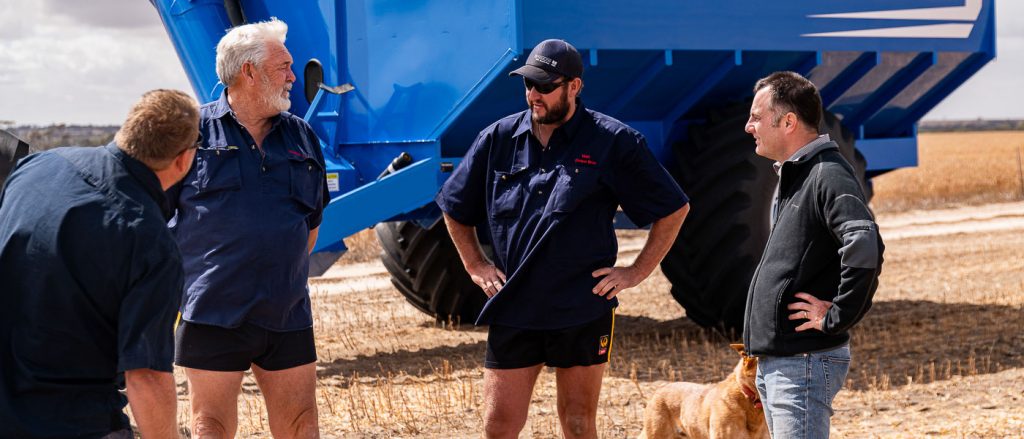“Great things in business are never done by one person. They’re done by a team of people”. Steve Jobs.
As a young person working for the Department of Agriculture in Western Australia, I remember taking a group of farmers for a tour of Erregulla Plains at Mingenew some time in the early to mid-1990s. Long-time Farm Manager of Erregulla, Kim Fleay was our host.
Being such a high profile and large farming operation we visitors were hanging off Kim’s words and what I distinctly remember is that Kim spoke mostly not of agronomy, machinery, or soils but rather people! Kim was at pains to tell us that people made the business. Whether they be full-time staff or casual operators it was they who made Erregulla Plains!
These words have stuck with me ever since, yet I wonder how many farm owners or managers think the same way?
Fast forward to 2022 and finding good farming employees has probably never been tougher than it is right now! Whether it’s a casual employee, an experienced operator, or a farm manager that is required the lack of overseas workers coming to Australia, mining again booming and the longer-term declining pool of people striving to work in agriculture and the country is impacting nearly all farm business.
This means that farm businesses are competing for talent both when it comes to recruitment but also when it comes to retention.
So how do you make your business stand out from the rest as a destination for employees but also one where employees want to stay once there? How do you become a truly great employer?
The following are some tips and whilst far from exhaustive should be a good starting point.
- Pay well – agriculture has no choice but to come to grips with what competitors are paying if we wish to attract and retain qualified and quality people. Remember also that many of you are in a good position to provide valuable fringe benefits including housing, vehicles, fuel, phones, meat, etc which all add up to the package offered. With regards to housing and vehicles, you may need to consider the quality of and whether further investment is required if you are to truly compete?
- Flexibility – whilst in farming, there will, of course, be tasks that require the full focus of employees there are most certainly plenty of times where you can provide flexibility with regards to working hours. Flexibility in working hours always comes out near the top of the list whenever employees are asked what they value most in a workplace so make it a priority to provide.
- Appreciate them – every single one of us wishes to feel appreciated. Make sure your employees are appreciated. As a general rule compliment people, magnify their strengths and not their weaknesses.
- Listen & value opinions – all employees want to be listened to so take the time to do just that. They will after all notice things that you don’t, and they may also see some things from a different perspective all of which can be very valuable. Look to implement suggestions too and provide due acknowledgment.
- Feedback & coaching – people always want and need feedback if they are to improve. But be considered as to how you do this. Feedback is not abuse for a mistake but rather tips and suggestions as to how the job could be done better.
- Involve in decision-making. “Tell me and I’ll forget, show me and I may remember but involve me and I will learn”! On top of learning involvement in decision-making fosters investment in the business and you which can only be good.
- Develop your employees – most people wish to be developed with regards to skills, knowledge, and capacity. A good employer understands this and makes it a priority.
- Make work fun / enjoyable! Goes without saying, doesn’t it? Look for ways to lighten the mood and install a sense of joy in the workplace. If an employee does not find work enjoyable you will not keep them for as long as you might like.
- Understand people have a life outside of work – just because you work 7 days a week and 12 hours a day every day does not mean your employee should be expected to. Respect their need and right for time away from work and if you notice that something in their personal life is affecting them at work acknowledge this and provide them with appropriate empathy and support.
- Reward employees – good employers always find appropriate ways to reward employees for doing a great job, going above and beyond, etc. Don’t just take excellent performance for granted.
- Don’t tolerate jerks! Ever found yourself with a ‘jerk’ of an employee who is good at their job? This can be a challenging situation especially in a time where it’s hard to find good workers but never underestimate the impact this person’s behaviour will have on other employees and also you. On a longer-term basis keeping a ‘jerk’ is never a good idea. They either change their ways, or you need to find a way to move them on!
- Be down to earth – there’s nothing worse than working for someone with a ‘big head’! Make sure this is not you as you are just another human being the same as the employee! One little tip is also to make sure you never ask the employee to do something that you wouldn’t be prepared to do yourself.
- Think like an employee – put yourself in the employee’s shoes to see the world from their perspective. This is showing empathy which is a key trait in building strong relationships.
- Culture – if you have and continually focus on culture being ‘the way we do things around here’ then you will be a long way to being a great employer. Remembering in a workplace good culture is one where all employees no matter their gender, skin colour, ethnicity, education, etc are equally treated and respected!
Of course, no matter how hard you try to be the best possible employer you will inevitably be faced with some of the challenges that come with being an employer and specifically workplace law. In the next issue, we will touch on some of the relevant workplace laws and some, in particular, that you need to be across.


